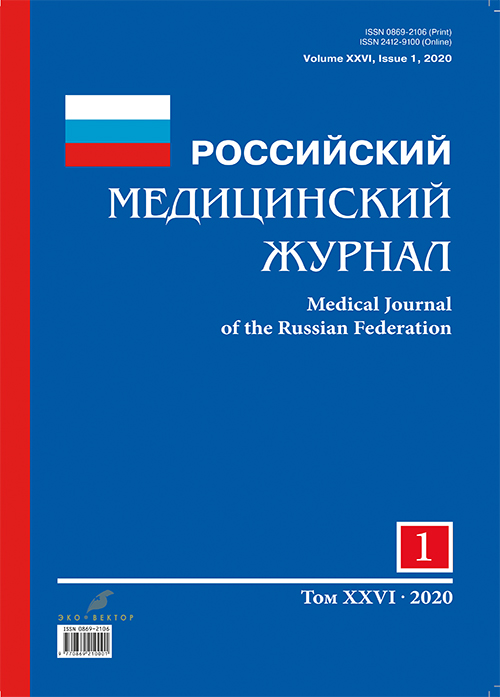Effectiveness of a multidisciplinary approach in the rehabilitation treatment of post-stroke patients at the outpatient stage of medical rehabilitation
- 作者: Fakhretdinov V.V.1, Brynza N.S.1, Kurmangulov A.A.1
-
隶属关系:
- Tyumen State Medical University
- 期: 卷 26, 编号 1 (2020)
- 页面: 4-9
- 栏目: Health care organization and public health
- ##submission.dateSubmitted##: 28.03.2020
- ##submission.datePublished##: 25.06.2020
- URL: https://medjrf.com/0869-2106/article/view/25848
- DOI: https://doi.org/10.18821/0869-2106-2020-26-1-4-9
- ID: 25848
如何引用文章
详细
Background. Current approaches to the rehabilitation of stroke patients are based on the early start of rehabilitation measures, a certain sequence, duration, and, of course, the active participation of the patient and their environment. Recently, the scientific medical community has engaged in a serious discussion on the organization of rehabilitation from the perspective of a multidisciplinary approach.
Aim. To assess the impact of the multidisciplinary approach to the outpatient rehabilitation phase on the main health components in stroke patients.
Materials and methods. An experimental, longitudinal, open study included 60 patients with stroke in the late residual period. The studied patients were classified into groups using stratification randomization: Group 1 – 30 (50%) patients with high rehabilitation potential, as well as a high degree of personal interest in undergoing the outpatient phase of medical rehabilitation; Group 2 – 30 (50%) patients who had rehabilitation potential but were, for several reasons, forced to refrain from undergoing the outpatient phase of medical rehabilitation. The duration of the outpatient rehabilitation phase was 14 days: the course of rehabilitation treatment included 10 visits to the rehabilitation department, which operates on the principles of lean manufacturing and a quality management system; 2 days of medical leave; and 2 days of independent work by patients. The multidisciplinary team included a neurologist, physiotherapy physiologist, physical therapy instructor, speech therapist, psychologist, occupational therapist, and a social worker who received special training in medical rehabilitation. As the criteria for assessing the effectiveness of rehabilitation measures during the course of this study, we identified 11 key indicators that allowed us to assess the recovery of neurological deficit, motor functions, possible risk of patients falling, psycho-emotional state, cognitive functions, level of disability, frequency of repeated strokes, number of visits to the clinic place of residence, level of independence, and quality of life of the patient.
Results. When we compared these groups in response to the course of rehabilitation treatment, the patients who passed the outpatient stage achieved a positive result of 91% (a positive response to 10/11 criteria for evaluating effectiveness), while the percentage of response to treatment in the second group was 18% (positive answer for 2/11 criteria for evaluating effectiveness).
Conclusion. To achieve the rehabilitation goals and objectives set for the patient in the late recovery period, it is advisable to conduct the outpatient phase of medical rehabilitation.
全文:
作者简介
Vitaly Fakhretdinov
Tyumen State Medical University
编辑信件的主要联系方式.
Email: fahretdinov_vv@mail.ru
ORCID iD: 0000-0001-8375-8244
graduate student of the department of the department of the department of public health care and health ICPD
俄罗斯联邦, 625023, Tyumen region, Tyumen, Odesskaya st., 54Natalya Brynza
Tyumen State Medical University
Email: brynzans@tyumsmu.ru
ORCID iD: 0000-0001-5985-1780
MD, associate professor of the department of public health and health care ICPD
俄罗斯联邦, 625023, Tyumen region, Tyumen, Odesskaya st., 54Al’bert Kurmangulov
Tyumen State Medical University
Email: kurmangulovaa@tyumsmu.ru
ORCID iD: 0000-0003-0850-3422
Ph. D., associate professor of the department of the department of public health care and health ICPD
俄罗斯联邦, 625023, Tyumen region, Tyumen, Odesskaya st., 54参考
- Luk’yanchuk T.P. The use of exoskeleton and functional electrical muscle stimulation in rehabilitation after a stroke. Avitsenna. 2019; (28): 30-2. (in Russian)
- Fakhretdinov V.V., Brynza N.S., Kurmangulov A.A. Modern approaches to rehabilitation of patients after stroke. Vestnik Smolenskoy gosudarstvennoy meditsinskoy akademii. 2019; 18(2): 182-9. (in Russian)
- Vlasova D.Yu., Karpov S.M., Sedakova L.V. Cognitive impairment in patients in the post-stroke period. Uspehi sovremennogo estestvoznaniya. 2013; (9): 126-7. (in Russian)
- Vincent-Onabajo G.O., Owolabi M.O., Hamzat T.K. Sensitivity and responsiveness of the health-related quality of life in stroke patients-40 (HRQOLISP-40) scale. Disabil Rehabil. 2014; 36(12): 1014-9. doi: 10.3109/09638288.2013.825652
- Vinogralov O.I., Komarov A.N., Pchelentsev M.V. A multidisciplinary approach to the treatment and rehabilitation of stroke. Effektivnaya farmakoterapiya. 2017; (21): 36-44. (in Russian)
- Galyaev I.Y., Barabanova M.A., Timchenko L.V., Zhadan O.N. Staging and continuity in rehabilitation of patients with neurosurgical issues. Innovatsionnaya meditsina Kubani. 2018; (1): 6-11. (in Russian)
- Kurmangulov A.A., Reshetnikova Yu.S., Frolova O.I., Brynza N.S. Introduction of the 5S lean manufacturing methodology in the healthcare system of the Russian Federation. Kubanskiy nauchnyy meditsinskiy vestnik. 2019; 26(2): 140-9. (in Russian)
- Kurmangulov A.A., Reshetnikova J.S., Bagirov R.N., Frolova O.I., Brynza N.S. Possibilities of visualization as a lean method in the management of medical organizations. Meditsinskiy vestnik Yuga Rossii. 2019; 10(1): 6-12. (in Russian)
- Srailova K.B., Raimkulov B.N., Raimkulova Kh.B., Bhat N.A., Abubakir U.A. Diagnostic parameters of a sickny syndrome in ischemic stroke. Vestnik Kazakhskogo Natsional’nogo meditsinskogo universiteta. 2019; (1): 210-2. (in Russian)
- Savchuk E.A., Savchuk E.O., Shevchenko I.V. Types of pain syndromes in stroke patients: clinic, diagnosis, treatment. Vestnik fizioterapii i kurortologii. 2018; 24(1): 127. (in Russian)
补充文件






